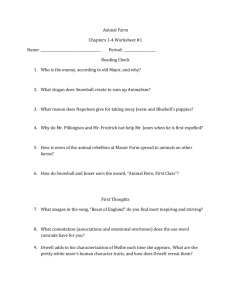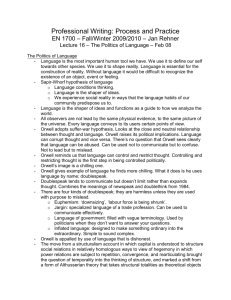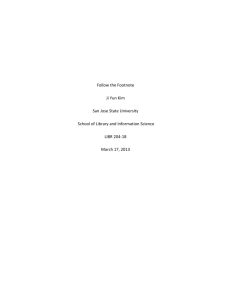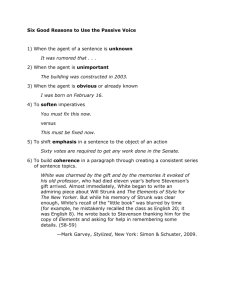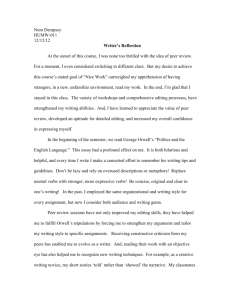The Contrast Between Adult and Childhood Perceptions in the
advertisement
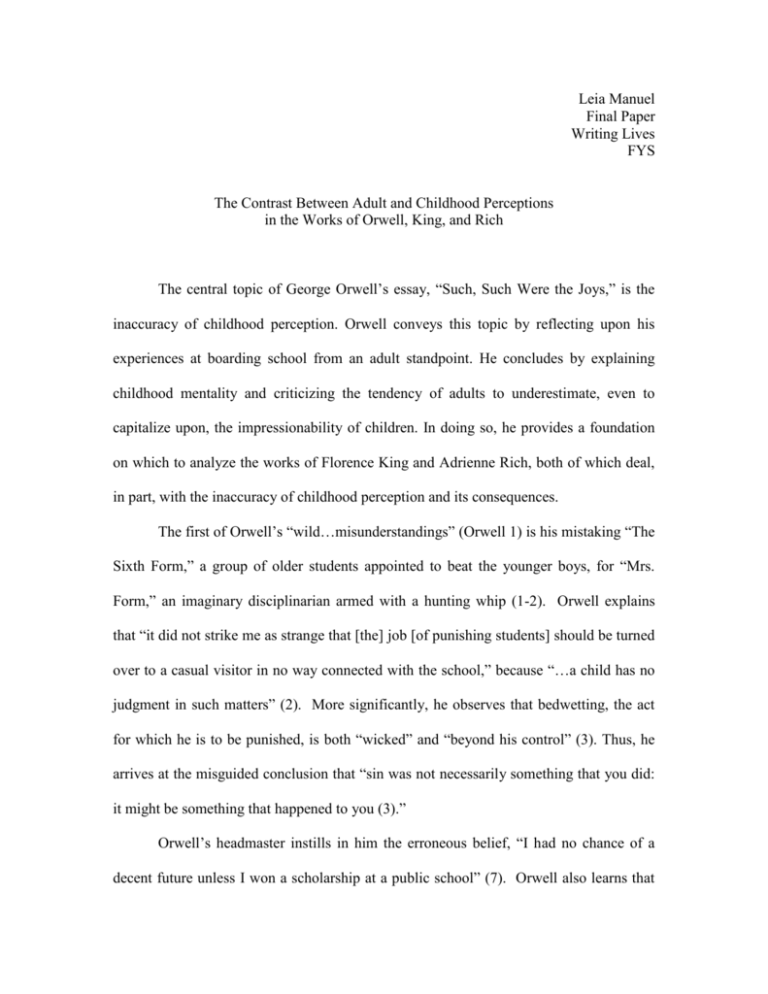
Leia Manuel
Final Paper
Writing Lives
FYS
The Contrast Between Adult and Childhood Perceptions
in the Works of Orwell, King, and Rich
The central topic of George Orwell’s essay, “Such, Such Were the Joys,” is the
inaccuracy of childhood perception. Orwell conveys this topic by reflecting upon his
experiences at boarding school from an adult standpoint. He concludes by explaining
childhood mentality and criticizing the tendency of adults to underestimate, even to
capitalize upon, the impressionability of children. In doing so, he provides a foundation
on which to analyze the works of Florence King and Adrienne Rich, both of which deal,
in part, with the inaccuracy of childhood perception and its consequences.
The first of Orwell’s “wild…misunderstandings” (Orwell 1) is his mistaking “The
Sixth Form,” a group of older students appointed to beat the younger boys, for “Mrs.
Form,” an imaginary disciplinarian armed with a hunting whip (1-2). Orwell explains
that “it did not strike me as strange that [the] job [of punishing students] should be turned
over to a casual visitor in no way connected with the school,” because “…a child has no
judgment in such matters” (2). More significantly, he observes that bedwetting, the act
for which he is to be punished, is both “wicked” and “beyond his control” (3). Thus, he
arrives at the misguided conclusion that “sin was not necessarily something that you did:
it might be something that happened to you (3).”
Orwell’s headmaster instills in him the erroneous belief, “I had no chance of a
decent future unless I won a scholarship at a public school” (7). Orwell also learns that
“you were no good unless you had a thousand pounds” (17). Thus, obsession with wealth
and status is passed down from the administration to the older students to the younger
boys. This stepwise corruption is shown through the interrogation of a new student on
pg. 19 and confirmed by the statement, “even if I had not learned this from Sim and
Bingo, I would have learned it from the other boys. Looking back, it is astonishing how
intimately, intelligently snobbish we all were…” (17).
Most injurious to Orwell is Sim and Bingo’s use of Christianity as a means of
intimidation. Their lecture on the “Temple of the Body” (14), designed to discourage
masturbation, merely instills in the students a blind fear of a mysterious offense. When
the older students are accused of sexually corrupting a younger boy, they are “bowed
down with shame,” though they are clueless as to what crime they have committed (1516). Orwell also fails to understand that black rings beneath the eyes are a supposed
symptom of masturbation; instead he deems them the mark of a “secret sinner” and
checks for them in the mirror (16).
Finally, when Orwell encounters a previously
expelled student on the street and finds that the boy’s life has not been spoiled by his
“sins,” he still adheres without question to the “sexual mythology” he has been taught
(16).
Orwell is unarguably damaged for life by adults’ abuse of his naiveté. First,
throughout the rest of his school career, he views himself as inferior (“…according to
[unalterable] law, I was damned. I had no money, I was weak, I was ugly, I was
unpopular…” pg. 20) and until the age of thirty he believes himself doomed to failure (“I
did know that the future was dark…failure behind me, failure ahead of me—that was by
far the deepest conviction that I carried away” pg. 23). Furthermore, he is denied a
2
common-sense religious foundation, as the twisted version of Christianity offered by Sim
and Bingo turns him off of religion altogether (“Till the age of about fourteen I believed
in God…But I was well aware that I did not love him. On the contrary, I hated him” pg.
20). This resentment can be directly traced to his childhood perception of Christianity’s
unfeasible standards (“…I lived among laws which were absolute…but which it was not
possible for me to keep” pg. 9) and the apparent futility of prayer (“Oh…the feeling of
cruel injustice, after all my prayers…at once again waking between the clammy sheets”
pg. 2).
In Southern Ladies and Gentlemen, Florence King contrasts childhood and adult
perceptions to convey the passing down of Southern mentality from generation to
generation. Like Orwell, she achieves this through anecdotes, explaining her childhood
mentality from an adult standpoint. For example, at the age of five, King sees nothing
strange about her grandmother’s refusal to use the term “tar babies” (King 11) in front of
blacks at a segregated lunch counter. Furthermore, she comes away with the idea that
“it’s all right to segregate people as long as you don’t hurt their feelings” (12). The adult
King is critical of her grandmother’s hypocrisy, labeling her an “arch-segregationist with
perfect manners” (12). In another instance, five-year-old King assumes that H. Rider
Haggard’s film She is about Eleanor Roosevelt, as Mrs. Roosevelt was often referred to
as “she” or “that woman” by Southerners who credited her with the problems of the
Roosevelt administration. As a grown woman, King realizes that an irrational desire to
revere FDR regardless of his actions caused Southerners to use his wife as a scapegoat.
King next overhears the use of female “honorifics” (54) in a phone conversation
and believes the world is ruled by a hierarchy of women. From an adult perspective,
3
Southern “gyneolatry” is less glamorous: the result of “the worship of white women for
political purposes” (54). Finally, King and her girl friend anticipate the development of
their breasts, which they feel will enable them to start wars and collapse governments.
This intense awareness of their own sexuality (“we thought we were perfectly wonderful,
rosebuds in a world of tempting blossoms” pg. 73) is instigated by older Southern women
whose “warnings” serve as seduction techniques (“When I got a little older—eight—
[Granny] told me what sitting in a man’s lap could do” pg. 72). In retrospect, King states
that “…neither we nor the adults around us viewed our behavior for what it was: colossal
egotism at the very least…” (73). She also admits that her ultimate goal as a preteen was
not to fall in love, but to make a man fall in love with her.
Though King’s primary purpose is entertainment, it can be argued that young girls
suffer an injustice at the hands of Southern culture. The obsession of King and her girl
friends with fine hair, tapering fingers, and fair skin is evidence of the pressure they feel
to fit the Southern female mold. The importance of debutante balls to Southern mothers
(Chapter 8) is not unlike the emphasis Sim and Bingo place on public school and the
Harrow History Prize—both result partly from the selfish desire of adults to bolster their
own reputations. In addition, King and her friends are encouraged to behave alluringly at
too young an age, and are taught to view male-female relations as a game of
manipulation. They also receive the message that any behavior is acceptable from an
individual with “good blood” (“[Royal Montgomery] could have had an abortion at the
foot of the Confederate monument and [the little old ladies] would not have cared” pg.
122).
4
In “Split at the Root,” Adrienne Rich contrasts childhood and adult perspectives
to convey the loneliness and confusion of searching for one’s own identity. Like King,
Rich is schooled early by Southern WASP society in how to “fascinate” men (Rich 2).
Not until adulthood does she recognize the romantic fantasies of Southern women as
“survival tactics, of a kind…knowing what I know about the white woman’s sexual role
in the Southern racist scenario” (2). In addition, she is raised to blindly accept the polite
discrimination of white social Christianity, which she now denounces {“we were taught
never to use [the word ‘nigger’]…(even as we accepted segregation, the eating taboo, the
assumption that Black people were simply of a separate species)” pg. 3}.
As a child, Rich cannot understand the disdain her father instructs her to show
when speaking the word “Jew” in The Merchant of Venice. She also fails to grasp the
seemingly sleazy association between Jews and money in The School for Scandal.
Looking back, she realizes it was her father’s inability to embrace his Jewishness that
prevented her from discussing anti-Semitism or even identifying herself as a Jew.
Finally, when Rich is sixteen, she defies her parents’ wishes by viewing newsreels of
concentration camps at a local theater. At the time, their accusation that “morbid
curiosity” compelled her to watch the films induces a strong sense of guilt. As an adult,
however, Rich shifts the blame to her parents, as it was their denial of Jewish culture that
forced her to seek information alone. Thus, she reflects upon her teen-aged self as a
confused innocent rather than a willful rebel: a “girl of sixteen, growing up in many ways
so precocious and ignorant…overwhelmed by a memory of despair, a sense of
inevitability…” (5).
5
It is apparent in Orwell’s essay that Bingo and Sim hope to increase their own
social standing through the success of their students {“…if I could go back, at my present
age…I should see [Bingo and Sim] as a couple of silly, shallow, ineffectual people,
eagerly climbing up a social ladder which any thinking person could see to be on the
point of collapse” (Orwell 25)}. Like Orwell, Rich is scarred at a tender age by the
behavior of adults concerned for their social status. Arnold Rich’s desire to be accepted
by gentiles and to advance his own career prevents him from providing his daughter with
a sense of identity. His cultural suppression is supported by the older Rich women, who
are careful not to exhibit the abrasiveness or flamboyance of “real Jews” (Rich 8). The
refusal of Rich’s parents to attend her wedding to the “wrong kind” of Jew further
reinforces their fear of being “drag[ged]…to the shtetl, the ghetto” (8) through
association with Jewish culture.
In statements like, “[my own identity and our family existence] were
shaped…by…my father’s self-hatred, and by his Jewish pride” (9) and “I feel the history
of denial with in me like an injury…those early lapses in meaning…are with me still”
(16), it is obvious that Rich’s cultural malnourishment at a young age has greatly
impacted her adult life. In addition, it could be argued that the unhealthy view of gender
relations Rich learned from her father (“I was learning in concrete ways a great deal
about patriarchy, in particular how the ‘special’ woman…is controlled and rewarded” pg.
11) prompted her confusion over the female role (“…I felt…unable to sort out what was
Jewish from what was simply motherhood, or female destiny” pg. 12) and conversion to a
lesbian lifestyle in middle age. It must be also be noted that Rich entered her ill-fated
marriage in search of wholeness and motivated by the need to escape her father’s
6
constraints (“I married in part because I knew no better way to disconnect from my first
family” pg. 10). She is spiritually deprived as well, for Arnold “[had] no use for
organized religion” (4), and her own religious experiences consisted solely of
meaningless rituals (“it was liturgy that mattered, not moral passion” pg. 4). Lastly, lines
such as “There was nobody in the world with whom I could discuss those films” (5), and
“It left me high and dry” (7) reinforce the inadequacy of Rich’s upbringing and her
resulting feelings of isolation.
According to Orwell, children suffer from “an utter lack of any sense of
proportion or probability,” which can cause them to “accept outrages and believe
absurdities” (Orwell 25).
The contrast between adult and childhood perceptions in
Orwell, King, and Rich emphasizes this impressionability, though the nature of adults’
transgressions against children differs among the three works. The women of the
Southern gynecocracy inflict harm inadvertently, through adherence to cultural norms
and expectations. Arnold Rich’s offenses are also unintentional: though his motives are
partially self-serving, he genuinely believes that by denying his Jewishness he is
protecting his family from discrimination. Social hierarchy burdens Bingo and Sim as
well, but their treatment of children is more sadistic and overtly abusive. Regardless of
adults’ intent, however, all three authors sustain significant damage as a result of their
childhood misunderstandings. This demonstrates that the words uttered and examples set
by adults can have powerful and lasting effects.
7

